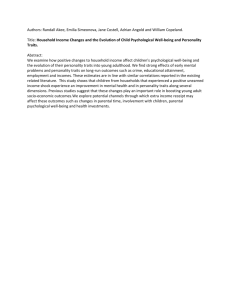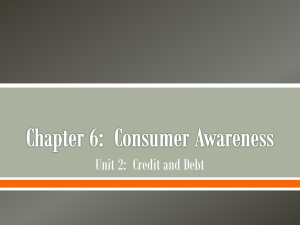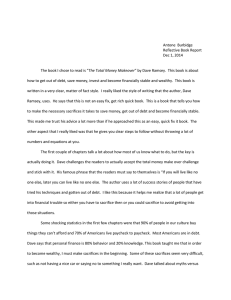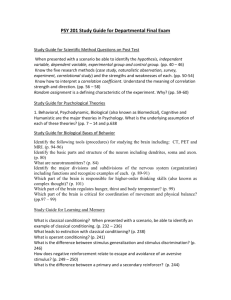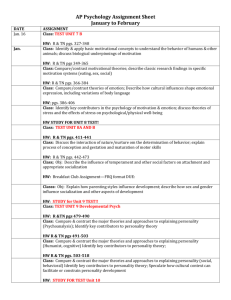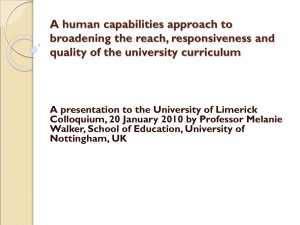Introduction to Personal Finance
advertisement
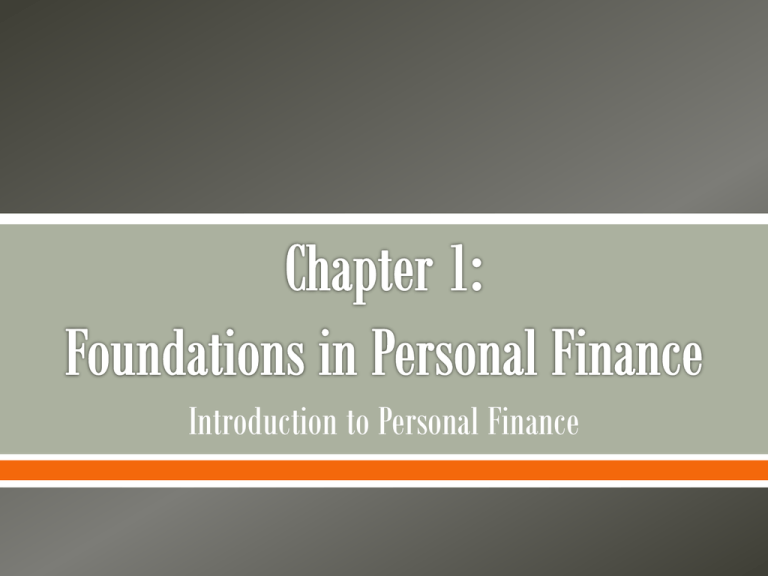
Introduction to Personal Finance Examine the charts, graphics, and reading excerpts in Chapter 1: Foundations in Personal Finance. o Make a list of questions you would like to have answered as we go through the chapter. Section 1 WB: Before You Begin, pgs. 10-11 o Review the Learning Outcome objectives and Key Terms o Complete the “Before” column on the “Measure Your Progress” chart Journal: 1. 2. 3. Can you think of a financial goal you have at this moment? Is this a long-term or a short-term goal? Describe how you plan to achieve this financial goal? Homework: Parent Interview Clay’s Candy Bar Madness (20 minutes) Video 1.1 (13 minutes): Key Components of Financial Planning Journal: In what ways could you do better when it comes to managing your money? What is personal finance? o Personal finance is all the financial decisions an individual or family must make in order to earn, budget, save, and spend money over time. Why is it important to set money goals? o Setting money goals gives you motivation to manage your money well. In what ways are people different when it comes to managing money? o Everyone has different strengths and weaknesses when it comes to managing money. Personal finance is 80% behavior and 20% knowledge Personal Finance Behavior Knowledge 20% 80% Section 2 Video 2.1 (15 minutes): A History of Credit and Consumerism Journal: What was Dave’s biggest lesson when it came to managing money and building wealth? Why aren’t Americans better at managing money? Describe the financial reality of most Americans? o Many Americans are drowning in debt and buying things they can’t afford. What can you do to make sure your future financial reality does not include debt? o Have an emergency fund, write a monthly budget and stick to it, and save for large purchases. What was one thing that shocked you about the history of credit and consumerism? Did learning about the history of credit make you want to manage money differently than the average American? Why or why not? Why is Dave so passionate about teaching people how to manage money and avoid debt? In what ways are Americans being outsmarted by the credit industry? Activity: o History of Credit in America, (25 minutes) Section 3 Video 3.1 (14 minutes): Learn the Language of Money Why is it important to know the language of money? o You need to know the language of money so you can understand your financial statements and communicate effectively about your finances. In what ways does your behavior affect whether or not you win with money? o Knowing how to manage money alone doesn’t ensure that you will manage your money behavior. It’s what you do with your money that matters most. What does it take to become money smart? o Basic math, understand the language of money, and manage your behavior with money. Describe the three levels of financial well-being. o Survival: Living paycheck to paycheck o Comfort: Moving toward financial security o Secure: Your money works for you When you’re an adult, who will determine your level of financial well-being? o You will! Why is it important to consider your money personality when developing a personal financial plan? o Develop a plan that works with your specific money strengths and weaknesses. Read: o What’s your money personality? pg. 18 o What does winning with money look like? pg. 22 Activities: o foundationsU.com/1 • Money Personality Quiz o What is Personal Finance? (25 minutes) o Draw a picture representing each of the three levels of financial well-being. 1. 2. 3. Survival Comfort Secure foundationsU.com/1 o Article Summary: • Are Credit Cards a Way of Life? • Tired of Keeping Up with the Jones? • 20 Things Broke People Say Complete the “After” column on the “Measure Your Progress” chart, pg. 11. Chapter 1 Summary, pg. 24-25 Study Guide: Money in Review, pgs. 26-27
